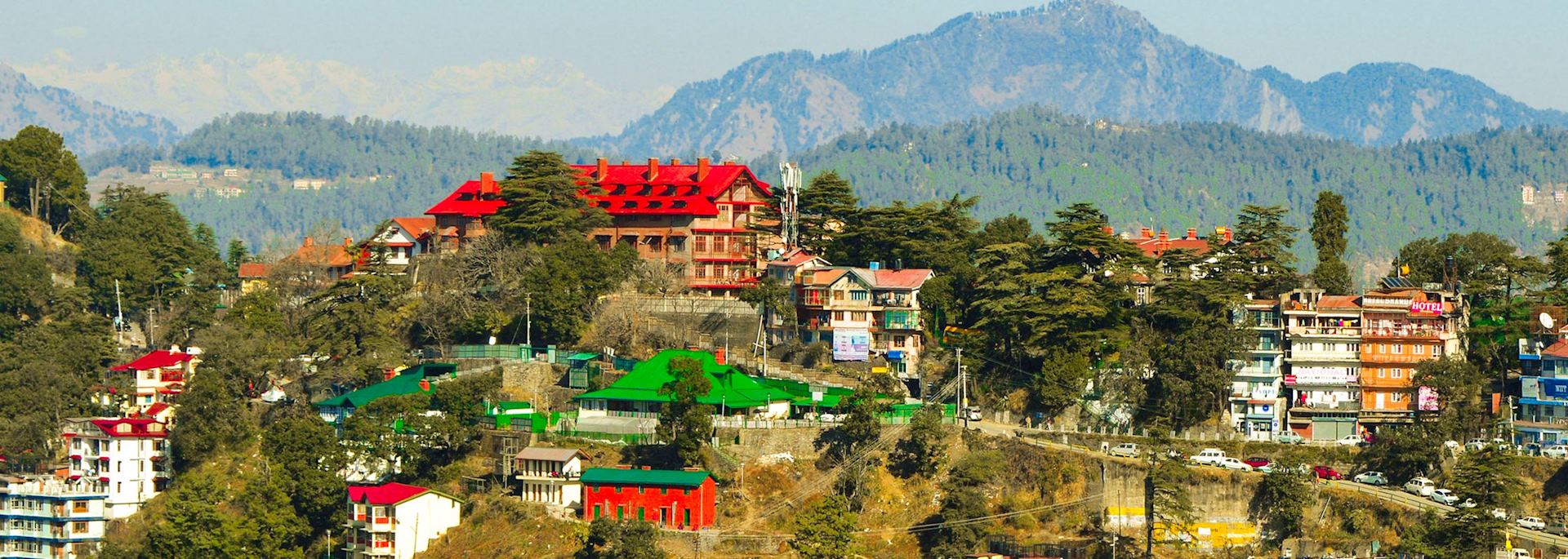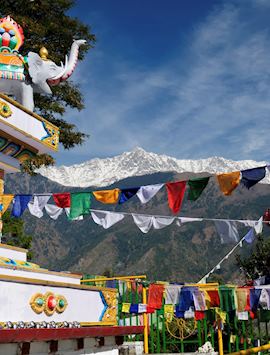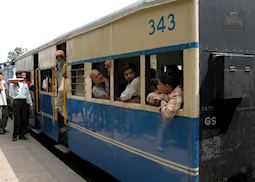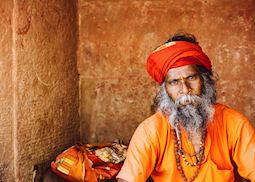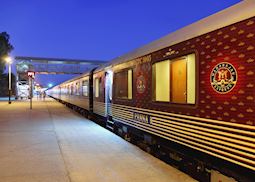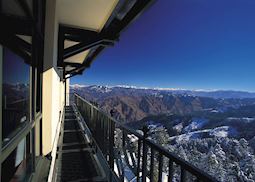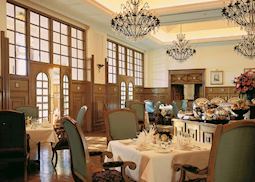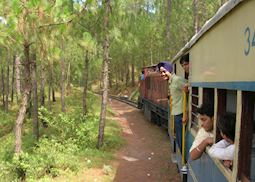Jump to:
The 19th-century British colonial government couldn’t cope with the heat of the Indian summers and searched the foothills of the Himalaya for a cool retreat. Some 2,100 m (6,889 ft) above sea level, they found the ideal climate in the tiny hamlet of Shimla, which was conveniently surrounded by a pine forest for building materials. The village blossomed into a thriving British hill station, where croquet on the lawn, rounds of golf, and afternoon tea on the terrace whiled away the days.
Today, the government may be Indian, but the town still exudes a colonial charm. Local people are proud of Shimla’s faded grandeur, children run around in English-style school uniforms and judges leave the town hall in wigs and robes.
India specialist BrynTraffic is restricted to the outskirts of Shimla, making it easy to explore on foot. I enjoy simply wandering through the streets, past the antiquated buildings and remnants of colonial times.
Things to see and do in Shimla
Arrive by toy train
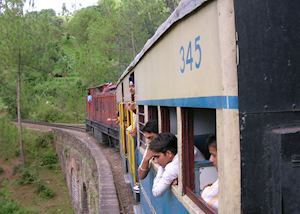 Each summer, the British government of India journeyed from a sweltering Calcutta to cooler climes in Shimla. This 1,800 km (1,118 mile) route was no holiday, taking five days by road and track. To ease their passage, a narrow gauge railway was built from Kalka, a railway hub near Delhi, right into the summer capital. While it’s possible to travel to Shimla by car, this isn’t a train journey that we’d recommend you miss.
Each summer, the British government of India journeyed from a sweltering Calcutta to cooler climes in Shimla. This 1,800 km (1,118 mile) route was no holiday, taking five days by road and track. To ease their passage, a narrow gauge railway was built from Kalka, a railway hub near Delhi, right into the summer capital. While it’s possible to travel to Shimla by car, this isn’t a train journey that we’d recommend you miss.
From Kalka, the train travels at a clunky 24 km (15 miles) an hour, through 103 tunnels and over 806 bridges. Ascending 2,169 m (7,116 ft) over five hours, it’s one of the steepest railway climbs in the world. These figures are impressive, but the views, right across the lower Himalaya, are the highlight of the journey. Stopping at 18 small stations along the route, you can catch sight of local life, such as the traders who dash to your window to offer you fresh chickpea dhal or a cup of chai.
Explore Shimla’s colonial streets
A constant stream of viceroys, soldiers, clerks and their families poured into 19th-century Shimla, creating a microcosm of British society. The comforts of a traditional British town were quickly built, including schools, churches, lodges and a post office. Most of the remaining buildings are now repurposed, but the mock-Tudor and baronial-style architecture has been affectionately preserved.
Starting at the buttermilk-yellow Christ Church overlooking the town, you can meander down the pedestrianized streets, which are trimmed with colonial frontages. The Gaiety Theatre, now an art gallery, once welcomed Rudyard Kipling and Lord Robert Baden-Powell to the stage. It’s difficult to miss the half-timbered town hall with its shingled eaves; it’s still the office of the Mayor of Shimla. The Viceregal Lodge, the summer residence of the Viceroy of India, is now an institute of advanced studies, but some rooms are open to the public.
Hike the foothills of the Himalaya
Many of Shimla’s hotel rooms boast views right across the foothills of the Himalaya, but to appreciate the scenery fully you need to explore on foot. A web of trails leads from the town, many well worn by farmers and traders before the British arrived. Shimla is surprisingly large, with new settlements mushrooming around the outskirts, so we recommend driving half an hour outside the town before beginning a guided walk.
One walk leads to the peak of Tara Devi Hill, and if you tackle it you’ll find at the top a 250-year-old temple dedicated to Tara Devi, the Hindu goddess of the stars. The 11 km (7 mile) walk follows switchback paths through thick pine forest, before clearing the tree line. From the peak you can see Shimla spread out below and the snow-covered higher Himalaya jutting out above.
Enjoy afternoon tea at Wildflower Hall
When Lord Kitchener, commander of the British Army, arrived in Shimla he noticed that many of his contemporaries had built elaborate summerhouses. Swiftly following suit, he commissioned Wildflower Hall, a 15-room mansion with an enviable position on a summit overlooking Shimla. The original mansion burnt down in 1915, but, ten years later, an even larger country house replaced it, which now runs as a luxury hotel.
Nodding to the days of Lord Kitchener, afternoon tea is taken on the outdoor terrace underneath fringed parasols. Tiny sandwiches and petit fours are served alongside local Himachali sidu (wheat-flour bread) and slices of akotri (gently spiced buckwheat cake). In the surrounding forest lies the hotel’s wild strawberry trail, a one-hour walk through cedar and pine trees where you might spot the iridescent monal pheasant, Shimla’s state bird.
Discover more of India’s foothills
Shimla is a gateway into the rest of the foothills region, with good — albeit windy — road connections. A day’s travel away, the foothills town of Dharamshala hosts the Tibetan government in exile. Here you can visit the Tsuglagkhang Complex, the official residence of the Dalai Lama and a refuge for sacred Buddhist texts. You’ll meet Tibetan refugees robed in traditional dress and be invited to try momos (steamed dumplings stuffed with vegetables).
From Dharamshala, a six-hour drive takes you to Amritsar and its lustrous Golden Temple. The holiest of Sikh shrines, the temple is surrounded by a marble water tank. Pilgrims travel from across the world to bathe in its sacred waters, said to have healing powers. The city is close to the border with Pakistan, where you can witness the daily border-closing ceremony, performed with military pomp and flamboyant marching.
Best time to visit Shimla
For crisp, clear skies and temperatures averaging a comfortable 59°F (15°C), October to November, then February to March are ideal times to visit. December and January can be quite cold and, with occasional snow flurries, are best avoided. April to June is the peak season for domestic visitors keen to escape the summer heat before the monsoon rains arrive in July.
Festivals, events and seasonal reasons to visit
- In early October, the Hindu festival of Dussehra commemorates the goddess Durga’s victory over a demon. The festivities culminate in the lighting of bonfires to burn effigies, accompanied by music and feasting.
- An integral part of Himalayan life, village fairs are used as a way to boost trade between townships. Shimla and its surrounding hamlets host a selection of seasonal fairs throughout the year, celebrating the first harvest, the end of the monsoon and the snow season.
who's been there
- 617-223-4195
- Make an inquiry
Suggested itinerary featuring Shimla
This sample itinerary will give you an idea of what is possible when you travel in Shimla, and showcases routes we know work particularly well. Treat this as inspiration, because your trip will be created uniquely by one of our specialists.
Places near Shimla
- Mussoorie 113 kilometers away
- Pragpur 121 kilometers away
- Dharamshala & McLeod Ganj 149 kilometers away
- Rishikesh 155 kilometers away
- Haridwar 160 kilometers away
- Amritsar 226 kilometers away
- Corbett Tiger Reserve 239 kilometers away
- Delhi 275 kilometers away
- Nainital 291 kilometers away
- Almora 292 kilometers away
- Ladakh 324 kilometers away
- Leh 344 kilometers away
- Alchi 348 kilometers away
- Nubra Valley 413 kilometers away
- Bharatpur and Keoladeo Ghana National Park 434 kilometers away
- Agra 445 kilometers away
- Fatehpur Sikri 449 kilometers away
- Samode 454 kilometers away
Photos of Shimla
Our expert guides to exploring Shimla
Written by our specialists from their own experiences of visiting Shimla, these guides will help you make the most of your time there. We share both our practical recommendations and the best ways to appreciate Shimla at its best.
-
India’s toy trains: Shimla, Darjeeling and Ooty ![Steam train up to Shimla]()
India’s toy trains: Shimla, Darjeeling and Ooty
India’s toy trains: Shimla, Darjeeling and Ooty
The toy trains of India cross valleys, ravines and rivers to access some of the country’s most scenic landscapes. India specialists share their experiences of riding on mountain railways from the Himalayan hill stations of Darjeeling and Shimla to the tropics of Ooty.
Read this guide -
What to do in India: our highlights guide ![Sadhu in Varanasi]()
What to do in India: our highlights guide
What to do in India: our highlights guide
Our India specialists pick some of their best things to see and do, and where to stay from the Himalaya to Kerala. Include spotting tiger, staying in a palace in Rajasthan, taking a boat trip down the Ganges and experience one of the country’s many festivals in your trip to India.
Read this guide -
Luxury rail journeys through India ![The Maharajas' Express Train]()
Luxury rail journeys through India
Luxury rail journeys through India
India specialist and former Mumbai resident Alison shares her experiences of luxury train journeys in India. She has picked out some of the most interesting routes and explains why they’re a fascinating way to explore India.
Read this guide
Accommodation choices for Shimla
We've selected a range of accommodation options for when you visit Shimla. Our choices usually come recommended for their character, facilities and service or location. Our specialists always aim to suggest properties that match your preferences.
-
![Mountains views from the Premier rooms at Wildflower Hall]()
The Oberoi Wildflower Hall
Shimla -
![Restaurant at The Cecil, Shimla]()
The Cecil
Shimla
Ideas for experiencing Shimla
Our specialists seek out authentic ways to get to know the places that could feature in your trip. These activities reflect some of the experiences they've most enjoyed while visiting Shimla, and which use the best local guides.
-
Shimla Toy Train ![Toy Train to Shimla]()
Shimla Toy Train
Shimla Toy Train
To appreciate the best views provided by the lofty train ride on the historic meter gauge line, you will catch the train from Shimla to Kandaghat station where you will be met by your driver.
View details
